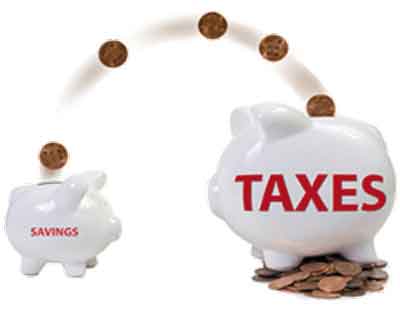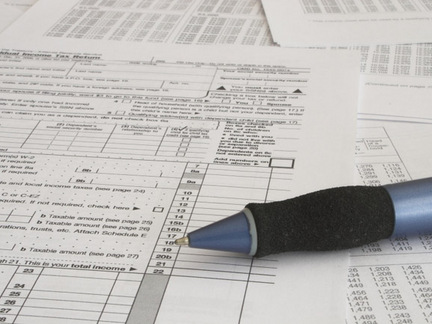How to save Tax ?
Learn the basic and most important tips that you may follow for saving and earning maximum tax deductions.

Most of the tax deductions are generated from an expense you pay. Common tax deductions include mortgage interest and real estate taxes paid by you. But there is one set of tax deductions that is even more powerful - tax deductions that you receive by saving, not spending.
Now here are some of the best tax saving tips that you can make use of to improve your cash flow and reduce your tax burden.
1) Tax code

2) Make charitable donations.

Remember that any donation worth more than $250 will require a receipt, and there are limits if you donate more than 20 percent of your adjusted gross income. Also, note that the amount of charitable deductions is generally limited to 50 percent of adjusted gross income. Consult the IRS website for a complete list of deduction limitations, as well as to check if the organization you're donating to is approved by the IRS.
You may consider donating goods that you no longer use. From clothes and old toys, to electronics, books, and furniture, there are a multitude of donations you can deduct. You can get tax deduction for donating a car. There are many car charitable donation organization to which you can donate vehicle for tax credit. The auto charitable donation may help you in deductions of tax that you owe to pay.
3) Retirement Planning

The maximum IRA contribution limit varies by year. The deadline for contributing to a traditional IRA and potentially receiving a tax deduction is not until the filing deadline of your tax return. Since the IRA contribution deduction is not an itemized deduction, nearly everyone who qualifies for the deduction will benefit. Some other deductions are only available to those who itemize, which is not the case with the IRA contribution tax deduction. If you decide to go with a Roth IRA, contributions are not tax-deductible, but will grow tax-free.
In addition to IRAs, people who have earnings from self-employment have several other opportunities to save for retirement while saving on their taxes. Typically, the limits for contributions to such plans are much higher than those for IRAs, often reaching the vicinity of 20% of net earnings from self-employment.
Even better than a tax deduction is a credit. A dollar tax credit saves you a dollar in taxes, whereas a dollar tax deduction saves you some percentage less. For lower income individuals who choose to save for retirement, the tax law provides for a Retirement Saver's Credit. The main aim of your's to save the tax should be to maximize your retirement paln contributions.
4) Home - Office deductions
If you are self-employed or run a business from home and qualify for the home office deduction, most tax experts recommend that you claim it. To qualify, you must use part of your home exclusively and regularly as your principal place of business, or on a regular basis for certain storage, as rental property, or as a home day care facility. Many self-employed individuals hesitate to claim the home office deduction for fear that it will raise suspicions at the income tax department and increase their chance of an audit. However, there is no statistical data to support this common belief.
5) Take all applicable Tax Credits

You can save if you have children. As a parent of children 17 and under, you can receive a credit. You can also save money if your children are attending school or college. You may have to look into what credits apply for undergraduate students as most credits have limited lifespans and are at times extended or replaced with other credit based programs. So by taking advantage of maximum and all applicable tax credits you can save your tax.
6) Tips for self employed tax payers

- Don’t forget to claim all your tax-deductible expenses, including cash expenditure where eligible.
- Claim the running costs of a car, but not the cost of buying one. If you use the same car privately, you can claim a proportion of the total costs. See our page on tax allowances for the self-employed for more.
- Choose an accounting year that ends early in the tax year. This maximizes the delay between earning your profits and your final tax demand.
- Carry forward losses from one year and offset them against profits from the next.

- If you rent out furnished accommodation in your own home then you can save your tax.
- Get landlord's expenses by renting out property. You can deduct a range of costs before declaring your taxable income. These include the wages of gardeners and cleaners, and letting agency fees.
- Get tax relief by the interest on a mortgage you take out to buy a rental property, even if it is the rental property which is abroad.
- Reduce the capital gains tax (CGT) on a rental property. If it has been your main home at some time in the past, you can claim tax relief for the last three years of ownership.

- Use your tax-free Isa allowance to save the tax.
- Get tax deductions on shares held in an Isa as there is no capital gains tax (CGT) to pay when you sell shares or units held in an Isa.
- Use Junior Isas or Children’s Bonus Bonds to avoid being taxed on gifts you make to your own children.
- Transfer savings and investments to your husband, wife or civil partner if they pay a lower rate of tax than you do.

- Get age related allowance. If you are aged 65+ then you may be eligible for an increased personal allowance. This means you pay a lower income tax rate.
- Stop making National Insurance contributions if you carry on working beyond state retirement age.
- If you are over 65, making donations to charity through Gift Aid can help you reduce your taxable income to below the threshold at which you start to lose out on age-related allowances.

- If you are a commuter then check to see if your employer will give you a tax-free loan to buy your season ticket.
- Use a pool car for occasional business travel, if your employer provides these.
- If you are entitled to a company car, consider whether it would be more tax-efficient to take a cash equivalent in pay instead.
- Contribute to your employer's pension scheme from your gross pay, before any tax is charged.

There are many popular tax preparation software that can significantly reduce the chances of such errors on your return, as they do all the math for you. Meanwhile you can consider contacting tax lawyers or accountants for preparation of your tax return file and be sure to confirm the accuracy of all the information you provide them.
So these were the Top 10 tax saving tips that you can make use for earning the maximum applicable tax deductions. If you have more tax saving tips then do share with us.